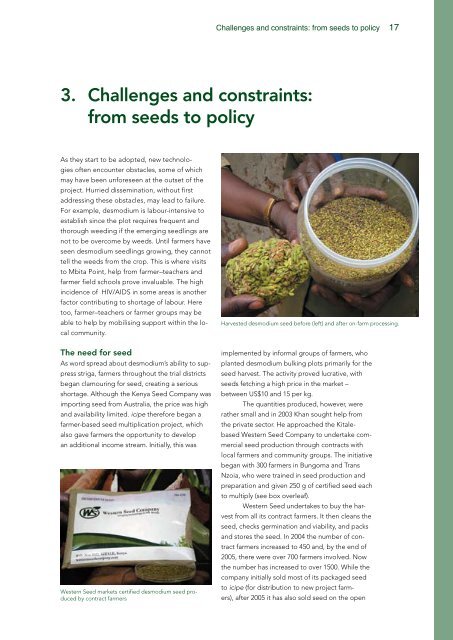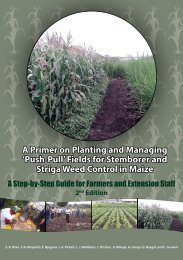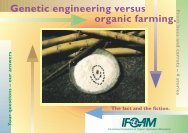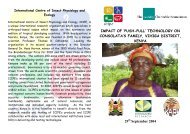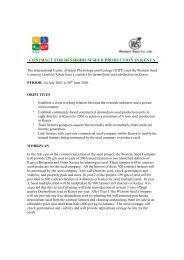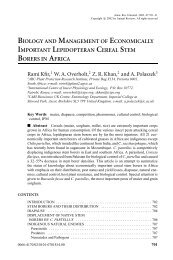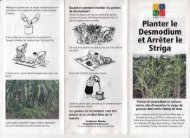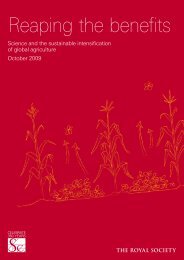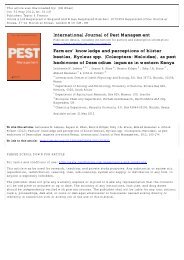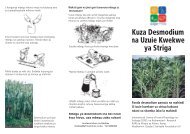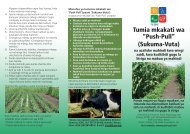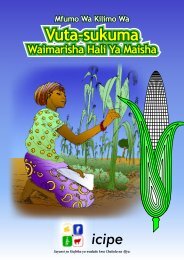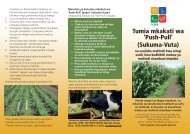a model for Africa's green revolution - Push-Pull
a model for Africa's green revolution - Push-Pull
a model for Africa's green revolution - Push-Pull
Create successful ePaper yourself
Turn your PDF publications into a flip-book with our unique Google optimized e-Paper software.
Challenges and constraints: from seeds to policy 17<br />
3. Challenges and constraints:<br />
from seeds to policy<br />
As they start to be adopted, new technologies<br />
often encounter obstacles, some of which<br />
may have been un<strong>for</strong>eseen at the outset of the<br />
project. Hurried dissemination, without first<br />
addressing these obstacles, may lead to failure.<br />
For example, desmodium is labour-intensive to<br />
establish since the plot requires frequent and<br />
thorough weeding if the emerging seedlings are<br />
not to be overcome by weeds. Until farmers have<br />
seen desmodium seedlings growing, they cannot<br />
tell the weeds from the crop. This is where visits<br />
to Mbita Point, help from farmer–teachers and<br />
farmer field schools prove invaluable. The high<br />
incidence of HIV/AIDS in some areas is another<br />
factor contributing to shortage of labour. Here<br />
too, farmer–teachers or farmer groups may be<br />
able to help by mobilising support within the local<br />
community.<br />
Harvested desmodium seed be<strong>for</strong>e (left) and after on-farm processing.<br />
The need <strong>for</strong> seed<br />
As word spread about desmodium’s ability to suppress<br />
striga, farmers throughout the trial districts<br />
began clamouring <strong>for</strong> seed, creating a serious<br />
shortage. Although the Kenya Seed Company was<br />
importing seed from Australia, the price was high<br />
and availability limited. icipe there<strong>for</strong>e began a<br />
farmer-based seed multiplication project, which<br />
also gave farmers the opportunity to develop<br />
an additional income stream. Initially, this was<br />
Western Seed markets certified desmodium seed produced<br />
by contract farmers<br />
implemented by in<strong>for</strong>mal groups of farmers, who<br />
planted desmodium bulking plots primarily <strong>for</strong> the<br />
seed harvest. The activity proved lucrative, with<br />
seeds fetching a high price in the market –<br />
between US$10 and 15 per kg.<br />
The quantities produced, however, were<br />
rather small and in 2003 Khan sought help from<br />
the private sector. He approached the Kitalebased<br />
Western Seed Company to undertake commercial<br />
seed production through contracts with<br />
local farmers and community groups. The initiative<br />
began with 300 farmers in Bungoma and Trans<br />
Nzoia, who were trained in seed production and<br />
preparation and given 250 g of certified seed each<br />
to multiply (see box overleaf).<br />
Western Seed undertakes to buy the harvest<br />
from all its contract farmers. It then cleans the<br />
seed, checks germination and viability, and packs<br />
and stores the seed. In 2004 the number of contract<br />
farmers increased to 450 and, by the end of<br />
2005, there were over 700 farmers involved. Now<br />
the number has increased to over 1500. While the<br />
company initially sold most of its packaged seed<br />
to icipe (<strong>for</strong> distribution to new project farmers),<br />
after 2005 it has also sold seed on the open


